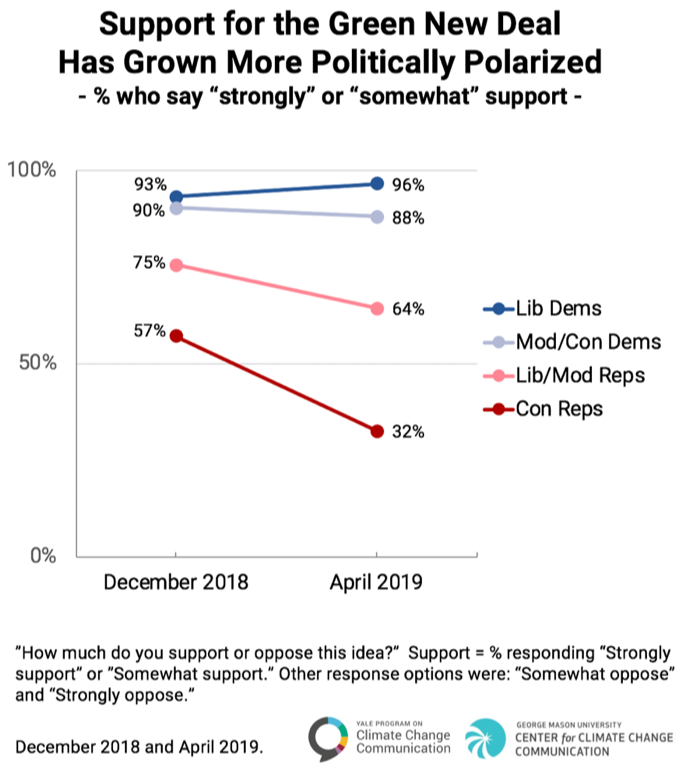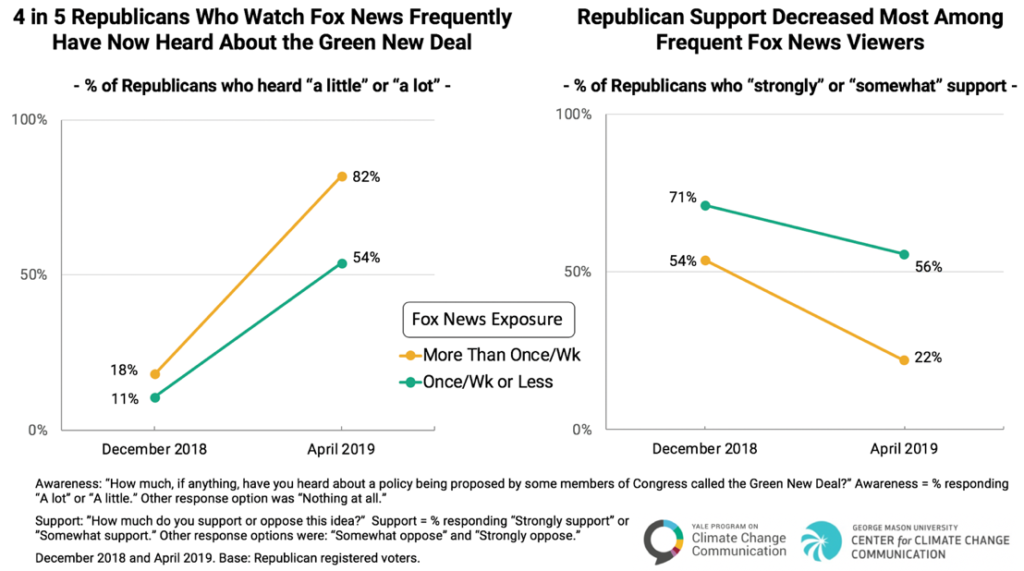Peer-Reviewed Article · Nov 18, 2019
How Political Polarization Increased on the Green New Deal
By Abel Gustafson, Seth Rosenthal, Matthew Ballew, Matthew Goldberg, Parrish Bergquist, John Kotcher, Edward Maibach and Anthony Leiserowitz
We are pleased to announce the publication of a new research article, “The development of partisan polarization on the Green New Deal” in the journal Nature Climate Change.
The Green New Deal, a proposed set of U.S. policies that seeks to address climate change, entered the political stage in early 2019 and continues to occupy the spotlight of the climate policy conversation. Our new article documents the dramatic changes in Americans’ awareness of and support for the Green New Deal in just four months. For example, we found that Republicans who regularly watch Fox News became much less supportive of the Green New Deal.
Data for this study were provided by the Climate Change in the American Mind survey, conducted in December 2018 and April 2019. By measuring familiarity with – and support for – the Green New Deal over time, we were able to observe the development of political polarization in attitudes about the Green New Deal while the issue was rising from obscurity to national prominence.
Although most people had not yet heard of the Green New Deal in December 2018, 81% of registered voters – including 64% of Republicans – expressed support for its policy goals after they were described. These goals include generating 100% of the nation’s energy from renewables instead of fossil fuels, investing in “green” technology research, and providing training for “green” jobs.
But as Americans heard more about the Green New Deal over the next 4 months, political polarization increased. Support among conservative Republicans decreased sharply from 57% to 32%, and by April 2019, Republicans who had heard the most about the Green New Deal were the least likely to support it.
This, then, raises the question of what Republicans were hearing about the Green New Deal and from where.
Between December and April, the Green New Deal was discussed frequently on conservative media. For example, in the week of the March 26th Senate vote on the Green New Deal resolution, Fox News covered the Green New Deal more than did CNN and MSNBC combined.
Our study found that Republicans who are frequent Fox News watchers were more aware and less supportive of the Green New Deal, compared with Republicans who watch Fox News less frequently. Further analyses found that Republicans’ frequency of viewing Fox News was a significant (negative) predictor of their support for the Green New Deal, even when controlling for alternative explanations such as education, age, mainstream news exposure, 2016 voter status, attitude toward socialism, and political ideology.
Overall, these rapidly shifting views of the Green New Deal are an example of how quickly partisan polarization can develop at the national level. These findings also support prior research showing how partisan media can increase opinion polarization.
The full article is available here to those with a subscription to Nature Climate Change. If you would like to request a copy, please send an email to climatechange@yale.edu, with the subject line: Request Green New Deal Paper.
This project was supported by the 11th Hour Project, the Endeavor Foundation, the U.S. Energy Foundation, the Grantham Foundation, and the MacArthur Foundation.


